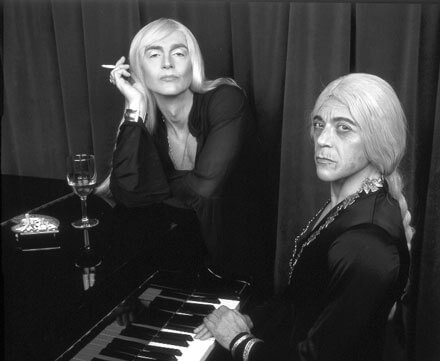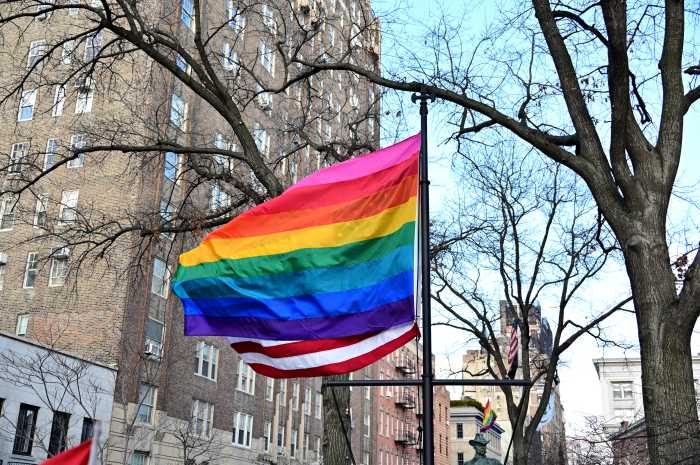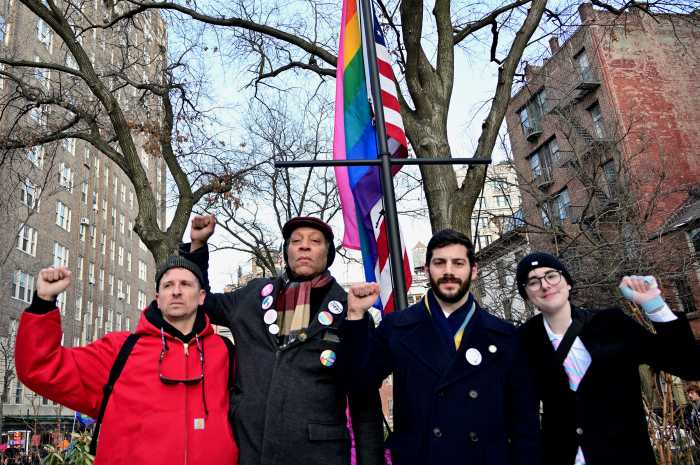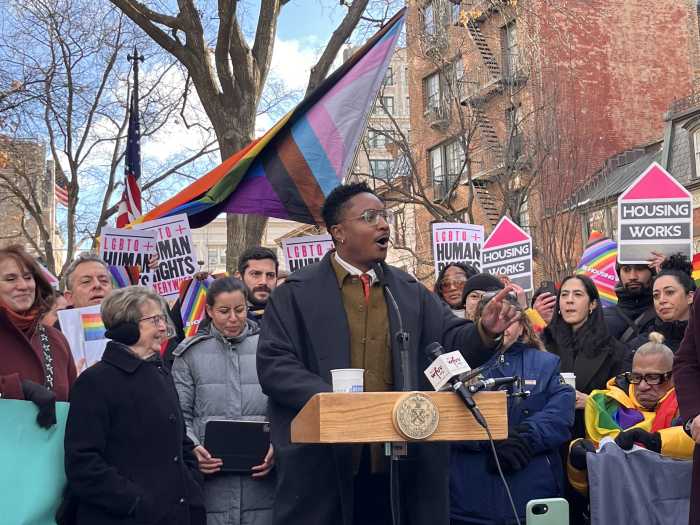John Kelly plumbs the politics underlying Joni Mitchell’s music
When we approached 45-year-old John Kelly, the multi-talented musical artist, for an interview, he was shocked.
“Well, the gay press hasn’t paid much attention to me,” he responded. “Earlier on––in the 80s––they paid more attention, when I was doing drag on a bar, but considering the way that gay culture has gone, my work doesn’t really answer to what they are looking for. The gay press of my generation is basically dead. There is this big gaping hole in my gay generation. The culture now is more about what’s happening to those in their 20s and 30s.”
But, Kelly, who launched a month-long weekend gig at Fez on March 5 featuring his stylings of the songs of Joni Mitchell, was happy to chat about the reprise of his performance as the grand dame of women’s folk music. Twice before––in 1997’s “Paved Paradise” and in 2001’s “Shiny Hot Nights”––Kelly appeared as Mitchell to wide critical and audience acclaim.
“Sometimes I feel as if my work is considered not out enough, not in-your-face gay man monologues,” he said. “And when my work happens to be drag, it’s not the type of drag that is easily embraced. It’s more complicated; it’s role-playing and performance art, it’s not predictable. It moves people and I think it is very political.”
In fact, it’s a bit jarring to see a drag performer not playing a fabulous diva, but rather an earthy, folk mama know for her poetry, sly wit, and vocal eclecticism. And if you wonder where the politics are in a Joni Mitchell review that includes songs recorded over a 35-year career, head downstairs at the Time Café and find out for yourself.
John Kelly is a performance artist, an actor who has graced theaters from LaMama to Broadway. Kelly grew up in Jersey City but two decades ago took the downtown art world by storm by dint of his virtuoso performances in music, dance, and theater––not to mention his stunning paintings, an avocation Mitchell shared.
Isn’t that enough to know? Oh no, honey. Throughout his career, Kelly has always been a consummate and classy drag queen, even in his early days at what was then the “it” bar––The Anvil. Now, his drag is tinged with politics, because that’s what he sees everywhere.”
“I am a substance queen so I like to clobber people with things,” Kelly conceded. “This show is really political, because Joni Mitchell’s work began in the era of the Vietnam War and got increasingly political as she got older. And this piece is a combination of her and me, of her time and the times we are experiencing now. So the war songs are about the past and now. It’s a character I am playing. It is an acting role, but I am present too. Her music has gotten more and more political has she has gotten older and I sing “Slouching Toward Bethlehem,” “The Fiddle and the Drum”–– it’s not a “Chelsea Morning” kinda’ concert. But we do perform many different songs so everyone gets a taste”
The more Kelly talks about the politics in Mitchell’s music, the more he steps forward to talk about his own politics.
“Where my head is at right now is that I am frustrated and angry and I am saying fuck it,” he said in an interview this week. “I say whatever I want to say, but I do it within the character. I say it within the confines of being Joni Mitchell.”
Neither Jon Kelly nor Joni Mitchell is on stage as a solo diva––the two are accompanied on keyboard by the wonderful Ezecca Esquibel, who worked with George Osterman and was in the 80s band Get Wet. Esquibel is in drag as Georgia O’Keefe. The conceit is not random––it is based on the relationship that the master painter developed late in her life with a pop icon with a love of watercolors.
“O’Keefe and Mitchell––they knew each other, they were friends, and much of the banter that Ezecca and I do is inspired from actual tapes of Mitchell concerts or interviews,” Kelly said. “It helps for both of us to play off one and other. It keeps us in character.”
In looking at the long arc of Mitchell’s career, Kelly samples not only her most recognizable folk standards, but also her later, ambitious, even experimental work, that drew heavily on jazz influences.
“I am doing this show on my terms, I am trying to clobber people with the unexpected,” he said. “But I want to do it on terms where I engage, not alienate people ”
Kelly’s focus on Mitchell’s repertoire and its political meaning is but one part of the broad canvas of his career. He trained at the famed American Ballet and also danced with the Harkness Ballet. He followed that training with a degree in painting from Parsons School of Design. This fall he will be in residence at Harvard teaching painting and working in a studio in Cambridge.
Kelly is not one that will ever be predictable. He insists that he aims to use all the arts and all of his skills to communicate.
“Performance art, it’s spectacle, it’s communication, it’s engagement,” he said. “Many people don’t know what to make of it, especially in our pigeon holing culture.”
But Kelly seems to know very well what to do. Through the vehicles of John Kelly and Company and the Dagmar Collective, his non-profit organization, he pursues a wide variety of grants and funding to expand the horizons of his work.
For now, Kelly is focusing on Joni Mitchell, and after that a film project with John Turturro. When all that’s done he plans to spend some time with his boyfriend, who acts with the Oregon Shakespeare Festival. But even as he looks forward to some time off, he took a moment for yet another admonishment for his audience.
“We the public are being manipulated and we are allowing it to happen,” Kelly said, in reference to the political climate today. “Now we are reaping the rewards of moving toward fear. Fear could get Bush elected again. People have to vote––wake up and vote. OK, that’s all.”



































